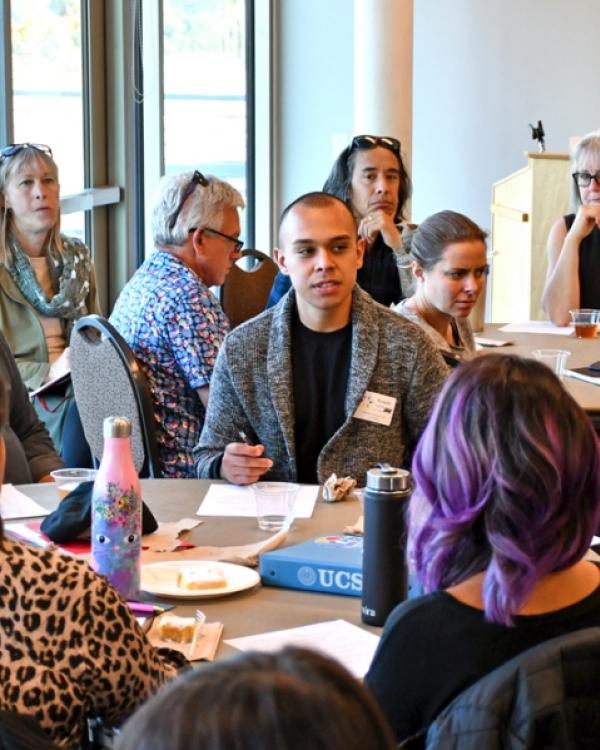
Gevirtz School Dean Jeffrey Milem and Dean of Social Sciences Charles Hale hosted the UC Santa Barbara Diversity Champions Lunch at Mosher Alumni Hall on Thursday, Oct. 31. This event, the last in UCSB Graduate Division’s 2019 Diversity Matters series, was intended for faculty members who already have advanced understanding of diversity issues and who wanted to be engaged in advancing diversity at UCSB. It featured a discussion of how faculty members can be more effective change agents, what they need to be better supported in this work, and how the campus can more effectively implement transformative change.
To lead that discussion, Dean Milem brought the students in his Doctoral Seminar in Policy and Leadership entitled Race (In)Equity in Higher Education. The session began with Ryan Arellano, Isaac Castro, Rodolfo Cerda, Charlene Macharia, Marilyn Monroy, Rachelle Mottus, and Bertin Solis—all doctoral students in the Department of Education—reflecting on their own experiences as students of color in higher education. They answered questions such as, “What can faculty do to support diverse graduate students in the classroom?” and “To what extent have professors built upon your community cultural capital/experiential knowledge/funds of knowledge to facilitate your success in your graduate program?”
Next the students asked the faculty, which came from departments all across campus, to answer questions about what they did in their classrooms and as advisors to provide support and inclusion for all students. This conversation was guided by questions such as: “As first-generation students, we find the hidden curriculum often sidelines us from knowing what the next step may be. How do you engage these students like us so that we feel comfortable asking questions? What do you do to transition us into this academic world?”
The discussion closed with a look at developing and compiling strategies and actions to strengthen equity, diversity, and access on campus. Some of that talk discussed how to optimize funding (for example, taking full advantage of the Presidential Postdoc Fellowship Program) to larger institutional change. Do we have sufficient understanding of how meaningful, sustained institutional change in top tier public universities takes place? As researches with interests in these matters, should some professors and graduate researchers be devoting a portion of their research time to turning the lens back onto our own institutions?
“An event like this one not only gives the campus a chance to see how much we have accomplished in achieving and sustaining diversity,” Dean Milem says, “but it also lets us see how much more we still have to do. Even better, with a room full of engaged students and committed faculty, we learn how much we can learn from each other. There is so much we can share and then model from.”